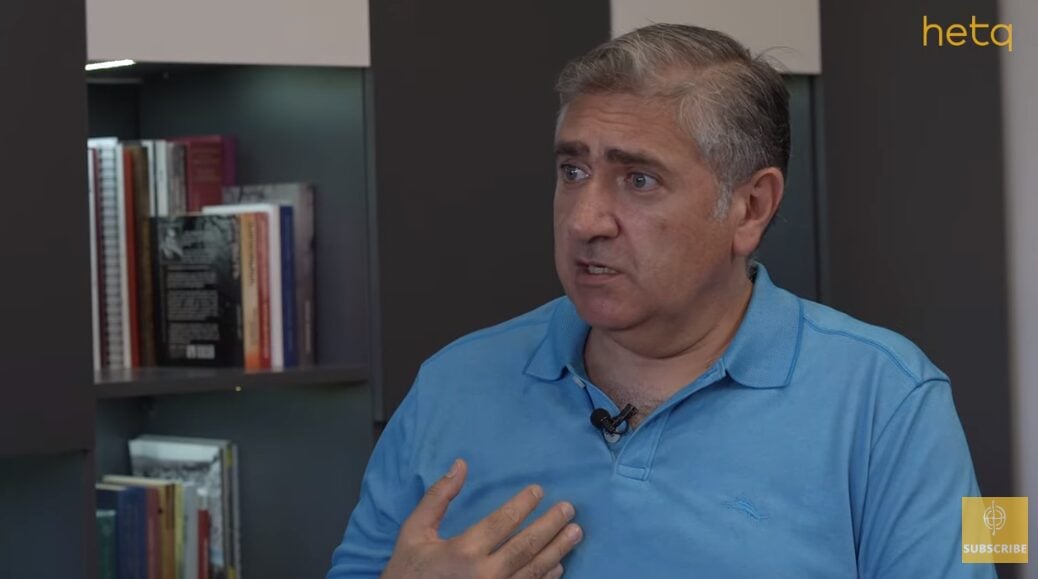During an interview with “Hetk” on July 23, Artur Khachatryan, a member of the Hayastan alliance, mentioned that the deputy speaker of the Israeli parliament, the Knesset, condemned Azerbaijan’s aggression during the four-day war of 2016. However, in the 44-day war of 2020, Israel was the main weapon supplier of Azerbaijan.
“How did it happen that the war broke out during his (Nikol Pashinyan’s, ed.) term?” He stated that it happened in 2016 as well. On April 3, 2016, the Jewish chairman of the Armenia-Israel parliamentary friendship group (who was in Armenia and was the deputy speaker of the Knesset) condemned Azerbaijan’s aggression. In 2020, Israel was the largest arms supplier to Azerbaijan, Artur Khachatryan said.
“Verified” found out that this claim by the deputy is misleading because Israel has been one of the primary weapons suppliers to Azerbaijan in 2020, 2016, and prior years.
Khachatryan’s statement that Knesset Deputy Speaker Tali Ploskov condemned Azerbaijan’s actions in 2016 is accurate. He made this statement during his visit to Armenia.
Ali Hasanov, the former adviser to the President of Azerbaijan, also criticized Israel for not providing vocal support to Azerbaijan.
Despite the lack of vocal support, Israel was one of the largest arms suppliers to Azerbaijan in 2016.
According to the Stockholm International Peace Research Institute (SIPRI), Azerbaijan and Israel commenced arms and ammunition trade in 2005.
SIPRI, a Swedish think tank, has been operating since 1966 and specializes in conflict and peace research. It studies the production and movement of arms and ammunition worldwide and publishes statistical data on arms trade between countries. The center gathers data from open sources, both official and unofficial. It’s important to note that the data published by SIPRI may not be entirely accurate, as arms deals can also occur secretly.
According to SIPRI data, in 2005, Azerbaijan purchased six units of the Lynx MRL (now known as PULS) multiple rocket launcher system and 50 EXTRA missiles from Israel. These missiles are classified as surface-to-surface missiles and are manufactured by Israel Military Industries. However, SIPRI notes that the year and quantity of the purchase may not be accurate.
In 2014, AzTV, an Azerbaijani television company, broadcasted footage of the launch of the Lynx by the Azerbaijani Armed Forces.
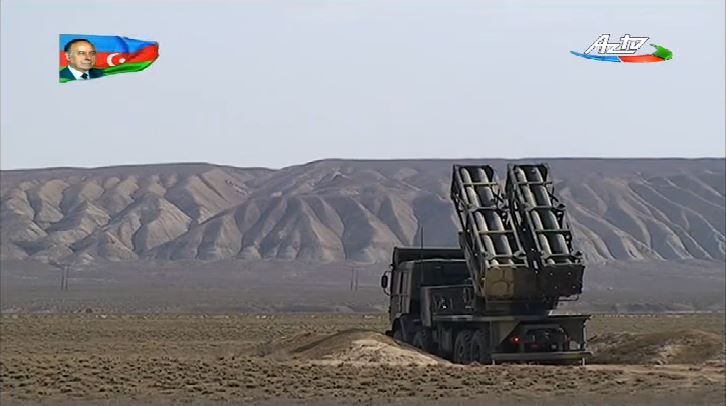
Lynx launch footage
There are reports about the supply of arms from Israel to Azerbaijan as early as the 1990s. Specifically, The Washington Institute reported in 2005 about the provision of combat aviation, artillery, anti-tank, and anti-personnel weapons from Israel to Azerbaijan.
In 2007, Azerbaijan purchased four Aerostar unmanned aerial vehicles (UAVs) from Aeronautics Defense Systems and has a license to manufacture them. In 2021, the RA Armed Forces released photos of a downed Aerostar, stating that Azerbaijan had attempted to enter Armenian airspace in the Gegharkunik Marz with drones. Additionally, in 2010, Azerbaijan acquired ten more Aerostars from Israel.
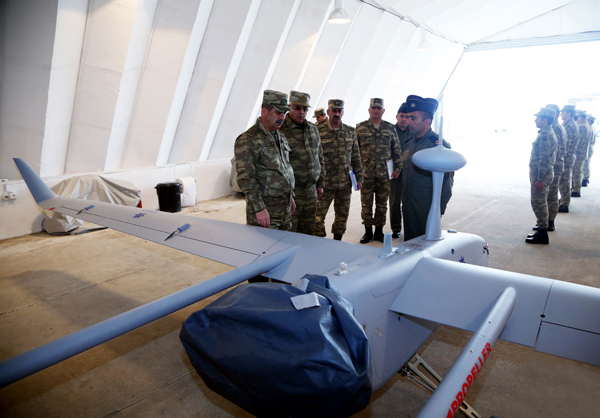
The Minister of Defense of Azerbaijan was presented with the Aerostar UAV, produced in Azerbaijan, 2016.
In 2008, Azerbaijan purchased ten Hermes-450 attack and reconnaissance UAVs delivered in 2013. However, the accuracy of this information is uncertain. The cost of the Hermes-450 aircraft alone is around $2 million, with an additional $10 million for the ground systems that support it. This UAV has a maximum speed of 176 km/h and can operate for up to 14 hours.
In 2008, the military also acquired five ATMOS-2000 self-propelled artillery installations, ten Sufa armored vehicles, and 100 Spike-MR multipurpose anti-tank missile systems. The number of Spike-MR systems increased by 250 in 2016. Additionally, ten CARDOM SP mortars were acquired. However, it’s important to note that SIPRI has indicated that the data may not be accurate.
In 2011, Azerbaijan purchased five tactical Searcher and long-range reconnaissance Heron UAVs. The country also discussed purchasing one Barak MX anti-aircraft defense system in 2023. Additionally, 40 units of the Barak-LRAD anti-aircraft missile system (AMS) were delivered in 2016, and 40 units of the Barak-ER the same year. There is footage of the Barak-LRAD being tested.
In 2013, Azerbaijan purchased six Shaldag and OPV-62 fast attack ships, as well as 100 units of LAHAT anti-tank guided missiles. A published photo of the missiles also exists. Additionally, in the same year, Azerbaijan acquired 250 Spike-NLOS missiles, which were delivered in 2018.
In 2014, the Azerbaijani army purchased 100 Harop units and two M-2288 radars. The first was delivered in 2018, and the second in 2014.
In 2015, 100 SandCat armored vehicles were purchased. In October 2020, the RA Ministry of Defense reported that one was shot down. The same year, Azerbaijan acquired a dozen SandCat Spike-LR type military vehicles.
In 2016, Aeronautics Defense Systems purchased 100 units of the Orbiter-1K kamikaze-type UAVs delivered in 2020. They also acquired ten Orbiter-3 reusable reconnaissance UAVs.
In 2009, Wikileaks released secret correspondence between Baku and Tel Aviv officials. The correspondence discussed the acquisition of high-quality weapons from Israel, which Azerbaijan couldn’t obtain from the USA or Europe.
During the clashes in April 2016, the Azerbaijani side employed combat drones. The Artsakh Defense Army released a photo of the downed ThunderB drone of Israeli production. This drone weighs around 28 kg, has a control distance of 150 km, a flight duration of 24 hours, and requires 2-3 people for operation.
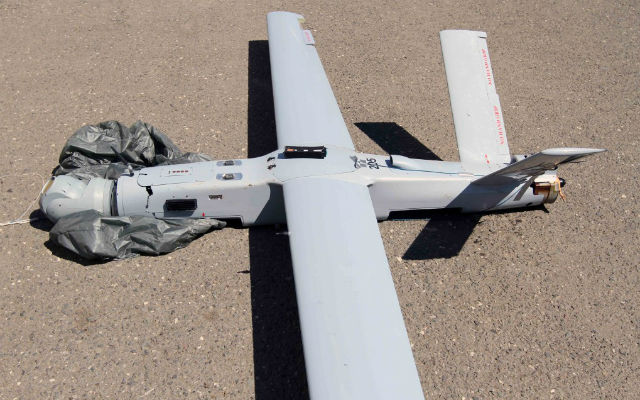
Downed ThunderB UAV
During the April clashes, Azerbaijani sources claimed that their forces had used Israeli-made Spike missiles to destroy “six enemy tanks.”
Following the April war, military analyst and researcher Leonid Nersisyan reported that Azerbaijan extensively used Israeli Israel Aerospace Industries (IAI) reconnaissance and kamikaze Harop drones. There is also a video depicting a UAV’s downfall during the four-day war. According to the Armenian side, on April 4, a Harop drone struck a bus transporting soldiers to the front, resulting in the death of 7 people.
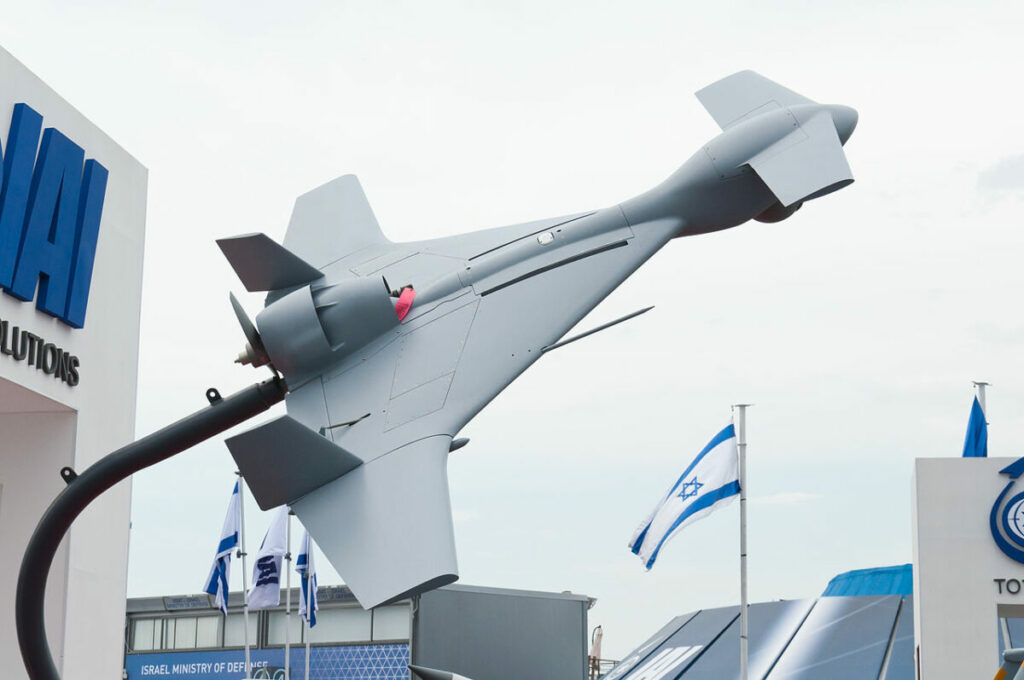
IAI Harop UAV
In 2012, Azerbaijan signed a $1.6 billion arms deal with Israel, which included drones, anti-aircraft systems, and anti-missile defense systems.
In December 2016, it was reported that Azerbaijan had purchased an Iron Dome air defense system from Israel. In the same month, President Ilham Aliyev of Azerbaijan announced that Israel had sold $5 billion worth of military equipment to Azerbaijan in recent years.
According to the World Arms Trade Analysis Center, from 2008 to 2015, Israel was the second largest supplier of weapons to Azerbaijan after Russia. The center reported that Israel supplied approximately $769 million worth of weapons and ammunition during this period.
Thus, Artur Khachatryan’s claim that Israel supplied the largest number of weapons to Azerbaijan in the 2020 war, while the deputy speaker of the Israeli parliament condemned Azerbaijan’s aggression in the 2016 war, is misleading. Israel has been supplying weapons to Azerbaijan since at least 2005. In 2016, Israel was one of the leading suppliers of arms to Azerbaijan, providing a substantial quantity of weapons.

